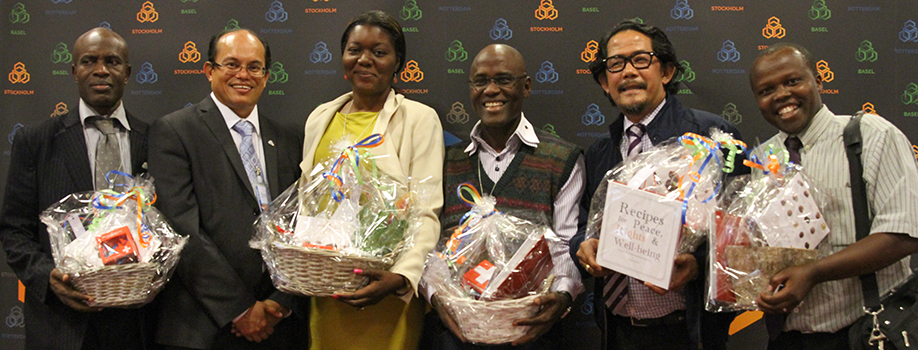
Rotterdam Convention
 Mr. Geri-Geronimo Sañez of the DENR (second from right) is among those recognized by the Secretariat of the Basel, Rotterdam and Stockholm Conventions for their use of the skills and knowledge acquired from technical assistance activities provided by the Conventions. Other winners were from Nigeria, Jamaica, Kenya and Cote d’Ivoire.
Mr. Geri-Geronimo Sañez of the DENR (second from right) is among those recognized by the Secretariat of the Basel, Rotterdam and Stockholm Conventions for their use of the skills and knowledge acquired from technical assistance activities provided by the Conventions. Other winners were from Nigeria, Jamaica, Kenya and Cote d’Ivoire.(Photo Source : http://www.emb.gov.ph/portal/haz/Home.aspx)
The staggering growth and proliferation of chemical production and trade during the past three decades spawned concern about the potential health and environmental risks posed by hazardous chemicals and pesticides particularly to countries without the wherewithal to monitor the import and use of these chemicals.
In the mid 1980s UNEP and FAO responded to these concerns by developing and promoting voluntary information exchange programmes. In 1985, FAO launched the International Code of Conduct on the Distribution and Use of Pesticides. In 1987, UNEP established the London Guidelines for the Exchange of Information on Chemicals in International Trade. In 1989, FAO and UNEP jointly introduced the voluntary Prior Informed Consent (PIC) procedure into these two instruments. In tandem, these instruments enabled governments assess the risk of hazardous chemicals thereby making informed decisions on their future import.
Officials in attendance to the 1992 United Nations Conference on Environment and Development in Brazil (Rio Earth Summit) adopted Chapter 19 of Agenda 21, which called for a legally binding instrument on the voluntary PIC procedure by the year 2000.
Thus, the Rotterdam Convention came into existence. The Convention creates legally binding obligations for the implementation of the Prior Informed Consent (PIC) procedure, covering pesticides and industrial chemicals that have been banned or severely restricted for health or environmental reasons by Parties to the Convention. These chemicals are listed under Annex III of the convention, which note the risks of using the chemicals.
The Convention entered into force in 23 February 2004.
In the mid 1980s UNEP and FAO responded to these concerns by developing and promoting voluntary information exchange programmes. In 1985, FAO launched the International Code of Conduct on the Distribution and Use of Pesticides. In 1987, UNEP established the London Guidelines for the Exchange of Information on Chemicals in International Trade. In 1989, FAO and UNEP jointly introduced the voluntary Prior Informed Consent (PIC) procedure into these two instruments. In tandem, these instruments enabled governments assess the risk of hazardous chemicals thereby making informed decisions on their future import.
Officials in attendance to the 1992 United Nations Conference on Environment and Development in Brazil (Rio Earth Summit) adopted Chapter 19 of Agenda 21, which called for a legally binding instrument on the voluntary PIC procedure by the year 2000.
Thus, the Rotterdam Convention came into existence. The Convention creates legally binding obligations for the implementation of the Prior Informed Consent (PIC) procedure, covering pesticides and industrial chemicals that have been banned or severely restricted for health or environmental reasons by Parties to the Convention. These chemicals are listed under Annex III of the convention, which note the risks of using the chemicals.
The Convention entered into force in 23 February 2004.
- Focal Office:
- Environmental Management Bureau (EMB)
- Date Ratified:
- July 31, 2006
- Focal Persons:
- Official Contact Point
ATTY. JUAN MIGUEL T. CUNA
Assistant Secretary and Concurrent Director
DENR - Environmental Management Bureau
Tel. Nos. - (632) 928 3725 / 927 1517
Technical Expert
MR. RENATO CRUZ
Chief, Environmental Quality Division (EQD)
DENR - Environmental Management Bureau
Tel. No. - (632) 928 8863
National Focal Point
MS. EMMANUELITA D. MENDOZA
OIC - Chief, Chemical Management Section
DENR - Environmental Management Bureau
Tel. No. - (632) 928 - 1212 - Commitments:
- The Rotterdam convention operates through two mechanisms; Prior Informed Consent (PIC) procedure which formally obtains and disseminates decisions of Parties who would wish to receive future shipments of chemicals listed under Annex III of the convention, and the Information Exchange which provides the venue for notification on hazardous waste regulation and problems caused by hazardous pesticide formulation.
The Philippines is presently working on the ratification of the Convention. - Status / Updates:
- The Philippines has submitted 27 Import Responses which may be accessed here, through the Rotterdam database.
- Policy Issuances:
- Memorandum Circular 2002 - 12
- DENR Administrative Order 1998-58
- DENR Administrative Order 2005-27
- Sources / Relevant Links:
This Page was updated on Thursday, 14 January 2016 20:03



